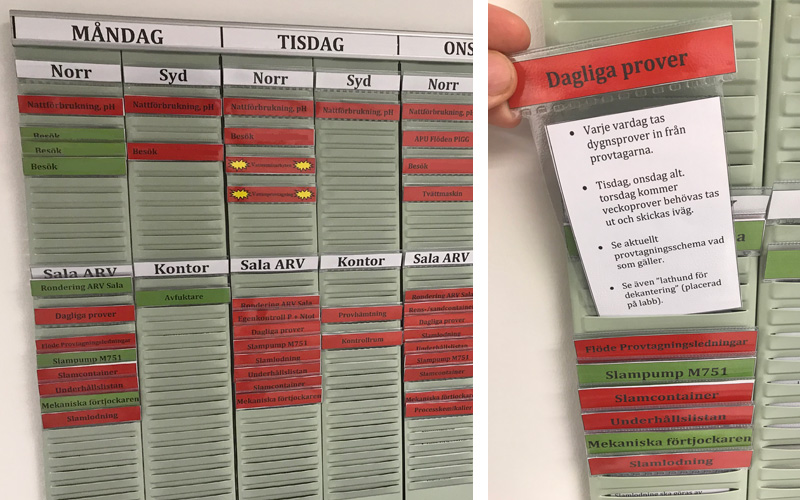Cards Have Created Structure in Our Daily Work

Cards Have Created Structure in Our Daily Work
At a wastewater treatment plant, there are many small daily tasks that must be completed to ensure the process is not disrupted.
Since staff are only on-site at certain times of the day, if an alarm goes off at night, we need to call in personnel on standby duty to resolve the issue. Each call-out is costly, so we have actively worked to reduce unnecessary standby duties and overtime expenses. We’ve achieved this by ensuring that all tasks required during the week are actually completed. If an alarm is triggered due to an issue caused by an uncompleted task, it will be evident because the corresponding card won’t be flipped. This allows us to discuss the matter with the person responsible for that department during the previous week.
Another advantage of the cards is that if someone falls ill or needs to leave unexpectedly, for instance, to care for a sick child, the rest of the staff can see which tasks have been completed and which have not. This ensures that no tasks are overlooked.
The cards have also made it easier to identify when someone is overloaded, as unflipped cards reveal that tasks aren’t being completed on time. This allows us to step in and support the individual in question.
We’ve also started using “order and cleanliness cards” to ensure that tasks like cleaning the washing machine or wiping down the dining table are done regularly. These cards are rotated so that everyone takes turns. These were tasks that were very difficult to get done before being visualized on the board but are now completed much more frequently.
We also use the board as a weekly planning calendar. At the start of the week, “visitation cards” are moved to the locations that need to be visited for inspections, etc., ensuring no area is forgotten.
Additionally, we have “special cards” marked with exclamation points, such as “water meter replacements.” On these days, technicians are out replacing water meters for customers and are unavailable for other tasks. The overview lets the rest of us adjust our plans so that the technicians’ “must-dos” are still completed. These “special cards” have just been introduced and are currently used a few times a month. We will gradually expand their use as we see they work well.
We’ve had to develop a system that works for us and have learned a lot along the way. I believe we’ve now found a method that suits us.
What we’d like to address next is creating a functioning system for monthly readings and tasks that are performed less frequently but are easily forgotten. This will likely involve another board from Efficienta, where cards can be picked and planned for less frequent tasks. This way, everyone can see what needs to be done, when, and by whom.
Mikael Viktorsson
Water and Wastewater Engineer, SALA Municipality